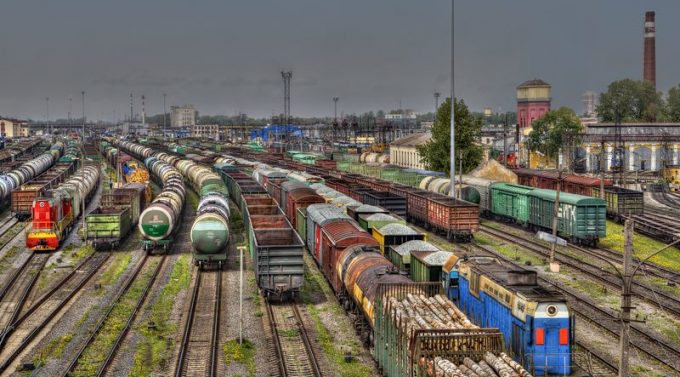China and Russia develop their cargo links with an 'Ice Silk Road'
China and Russia are continuing to expand their Arctic container shipping links. They have launched a ...
TFII: SOLID AS USUALMAERSK: WEAKENINGF: FALLING OFF A CLIFFAAPL: 'BOTTLENECK IN MAINLAND CHINA'AAPL: CHINA TRENDSDHL: GROWTH CAPEXR: ANOTHER SOLID DELIVERYMFT: HERE COMES THE FALLDSV: LOOK AT SCHENKER PERFORMANCEUPS: A WAVE OF DOWNGRADES DSV: BARGAIN BINKNX: EARNINGS OUTODFL: RISING AND FALLING AND THEN RISING
TFII: SOLID AS USUALMAERSK: WEAKENINGF: FALLING OFF A CLIFFAAPL: 'BOTTLENECK IN MAINLAND CHINA'AAPL: CHINA TRENDSDHL: GROWTH CAPEXR: ANOTHER SOLID DELIVERYMFT: HERE COMES THE FALLDSV: LOOK AT SCHENKER PERFORMANCEUPS: A WAVE OF DOWNGRADES DSV: BARGAIN BINKNX: EARNINGS OUTODFL: RISING AND FALLING AND THEN RISING

Russia’s rail operators have stepped up their efforts to find new markets to offset crippling sanctions imposed by the west following the invasion of Ukraine.
A new RZD Logistics service links Moscow, India and the UAE, using the 7,200km International North South Transport Corridor (INSTC) through Turkmenistan, Kazakhstan and Iran from the city’s Agrohub terminal.
And approval has been given for a China-Russia bridge that will save 2,000km on some routes.
RZD Logistics CEO Dmitriy Murev said: “We have been successfully cooperating with this terminal [Agrohub] for several years. It has proved a reliable and effective platform for enhancing exports from Moscow, and in the reverse direction. We have no doubts regarding the prospects of a new route via the INSTC, because of the increasing role of this corridor.”
The INSTC was formed following an agreement between India, Iran, and Russia more than two decades ago.
Deputy head of the Moscow government Georgiy Filimonov said Agrohub had already led to a surge in Russian agricultural exports to China and other Asian countries, and added: “This year it will export over 200,000 tonnes of goods, with a larger range of countries served.
“Its convenience cuts the time of product delivery and allows regional producers to present their products on foreign counters.”
The new link from RZD is only its second since Russia’s invasion of Ukraine last year, and follows a service between Moscow and Shandong.
The increased focus on China has brought infrastructural developments, including the bridge, linking Mohe, China’s northernmost city, with the town of Dzhalinda in the republic of Sakha on Russia’s north-east border, across the Amur River that separates the two countries.
Aysen Nikolayev, a representative of Sakha, said: “The bridge will increase the capacity to export goods to up to 10m tonnes a year. It will also relieve the rail tracks in the region and the loss of the need for of transhipment will have a positive impact on the ecology.”
Turning east appears to be the only thing Russian rail operators can do. Russia’s rail container volumes plunged last year, with figures indicating a 15.8% year-on-year decline. Fesco noted a 12% drop in imports, to 2.1m teu, and exports collapsing 25%, to 1.5m teu.
Comment on this article